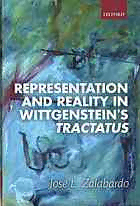
Representation and reality in Wittgenstein’s Tractatus PDF
Preview Representation and reality in Wittgenstein’s Tractatus
Representation and Reality in Wittgenstein’s Tractatus Representation and Reality in Wittgenstein’s Tractatus José L. Zalabardo 1 1 Great Clarendon Street, Oxford, OX2 6DP, United Kingdom Oxford University Press is a department of the University of Oxford. It furthers the University’s objective of excellence in research, scholarship, and education by publishing worldwide. Oxford is a registered trade mark of Oxford University Press in the UK and in certain other countries © José L. Zalabardo 2015 The moral rights of the author have been asserted First Edition published in 2015 Impression: 1 All rights reserved. No part of this publication may be reproduced, stored in a retrieval system, or transmitted, in any form or by any means, without the prior permission in writing of Oxford University Press, or as expressly permitted by law, by licence or under terms agreed with the appropriate reprographics rights organization. Enquiries concerning reproduction outside the scope of the above should be sent to the Rights Department, Oxford University Press, at the address above You must not circulate this work in any other form and you must impose this same condition on any acquirer Published in the United States of America by Oxford University Press 198 Madison Avenue, New York, NY 10016, United States of America British Library Cataloguing in Publication Data Data available Library of Congress Control Number: 2015935341 ISBN 978–0–19–874394–1 Printed and bound by CPI Group (UK) Ltd, Croydon, CR0 4YY Links to third party websites are provided by Oxford in good faith and for information only. Oxford disclaims any responsibility for the materials contained in any third party website referenced in this work. Acknowledgements I have benefited from conversations or correspondence with Don Berry, María Cerezo, Kit Fine, Marcus Giaquinto, Peter Hanks, Colin Johnston, Mark Kalderon, Michael Kremer, Mike Martin, Michael Morris, and Stephen Read. I am also grate- ful to three anonymous referees for Oxford University Press for their tremen- dously helpful comments. I have presented some of this material at the following conferences and work- shops: “Wittgenstein and the Transcendental,” Essex University and Institute of Philosophy, London; “Reading Wittgenstein,” UCL and Institute of Philosophy, London; “Wittgenstein and the Philosophy of Perception,” King’s College, London; “The Viability of Metaphysics,” Durham; “Inferentialism in Epistemology and the Philosophy of Science,” UNED, Madrid, and “The World as I Found It,” University of Fribourg. I have also presented these ideas in my Early Wittgenstein lectures at UCL and in a postgraduate seminar at the University of Valencia. I am grateful to all these audiences for their comments. Chapter 3 and Appendix I use material from “Wittgenstein’s Nonsense Objection to Russell’s Theory of Judgment,” in Michael Campbell and Michael O’Sullivan (eds), Wittgenstein and Perception (Abingdon: Routledge, 2015). Appendix II uses material from “Reference, Simplicity and Necessary Existence in the Tractatus,” in José L. Zalabardo (ed.), Wittgenstein’s Early Philosophy (Oxford: Oxford University Press, 2012). I am grateful to these publishers for permission to reproduce this material. Contents Introduction 1 1. Russell’s Theories of Judgment 13 2. Wittgenstein and Forms 37 3. The Vanishing Subject 87 4. Propositions and Facts 108 5. The Limits of Representation 149 6. Logic and Analysis 185 Conclusion 228 Appendix I: Other Readings of the Nonsense Objection 233 Appendix II: The Empty-Name Reading of the Substance Passage 243 References 255 Index 261 Introduction I.1. Wittgenstein’s Programme A book is an act of communication. Its author intends to produce with it a certain effect in the mind of her readers. The precise effect that that an author intends to produce with her book varies widely from genre to genre. The authors of novels, poetry volumes, self-help books, and scientific manuals, for example, seek to affect their readers in very different ways. Scientific manuals and other pieces of academic writing tend to follow a par- ticularly straightforward pattern. These books present facts, theories, or expla- nations that their authors believe to be correct. The authors’ goal is to get their readers to accept their claims. Success will come about when the reader accepts the claims expressed in the book. If the claims are correct, the reader will have learnt something about the world from the book. Many philosophy books follow this pattern. They present philosophical doc- trines that their authors believe to be correct, with the intention of making their readers accept these doctrines. The author succeeds when the reader accepts the doctrines presented in the book. When this happens, if the doctrines are correct, the reader will have learnt something about the world from the book. Readers of Wittgenstein’s Tractatus Logico-Philosophicus, especially those who skip the preface, can easily get the impression that it is this kind of book. For the most part, the Tractatus seems to be devoted to presenting philosophical doctrines—about the structure of the world, linguistic and mental representation, the nature of logic and mathematics, and other traditional philosophical subjects. Readers then naturally assume that Wittgenstein believes these doctrines to be correct, and that his goal is to get them to accept these doctrines—that, according to Wittgenstein, we will learn something about the world from the Tractatus if we accept the doctrines that are expressed in it.
